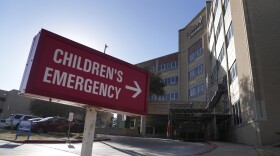
Bonnie Petrie
Bioscience & Medicine Reporterbonnie@TPR.org
BlueSky: @bonniepetrie.bsky.social
Bonnie Petrie covers bioscience and medicine for Texas Public Radio and is the host of the Petrie Dish podcast, which explores the intersection of science, medicine, and life in the 2020s. She also brings you the latest research happening at UT Health San Antonio in a weekly report called Science & Medicine.
Bonnie grew up on the Canadian border in northern New York, but called Texas home for more than 20 years. She has twice been nominated for the Texas Radio Hall of Fame in recognition of her work in Houston, Dallas, and San Antonio, but claims she's still too young for all that. She has also received many Edward R Murrow, Associated Press, and other journalism awards. She and Petrie Dish have been honored with several Gracie Awards from The Alliance for Women in Media, including personal recognition as the best host of a local show in the nation.
Bonnie is mom to a college student, two dogs, two cats and spends her free time solving family mysteries using genetic genealogy.
-
A study of two groups of 70-year-olds found that branched-chain amino acids combined with exercise improve physical function and quality of life. Exercise alone did not.
-
The diversion center would focus on low-level offenders who have untreated mental illness, intellectual or developmental disorders, or substance use disorders. The goal would be to ease jail overcrowding while saving taxpayers money and improving outcomes for those who avoid jail.
-
From COVID-19 research to Parkinson's disease therapies, these statistical experts turn numbers into answers, helping doctors make evidence-based decisions that improve patient care.
-
Many medications ease the constellation of symptoms that define Parkinson's disease, but the only treatment that slows the progression of the neurological movement disorder can't be purchased at a pharmacy. It's high-intensity, cardiovascular exercise, like boxing, and it's changing lives.
-
The chemical cross-communication between the guts and other organs that occurs when a person metabolizes nutrients begins before we open our mouths, when we see or smell food. The answer to why some people develop obesity, diabetes, and other metabolic disorders, and why some people respond so well to medicines like Ozempic, might lie in those signals. UT Health San Antonio endocrinologist Dr. Marzieh Salehi is studying that communication in patients with spinal cord injury.
-
Jannine Cody, PhD, founded and leads the Chromosome 18 Clinical Research Center, which has revolutionized the understanding of and care for disorders caused by alterations in chromosome 18 in humans. However, Cody began this mission as a mom with a baby with a chromosome 18 disorder who needed care.
-
Health and Human Services Secretary Robert Kennedy Jr. has ordered a dramatic reduction in the number of vaccines recommended by the Centers for Disease Control. Does this mean you should change the number of vaccines your child receives? A practicing pediatrician in Texas is among the large number of children's health experts who say no.
-
New research from UT Health San Antonio finds a link between obstructive sleep apnea and persistent pain, suggesting that the intermittant lack of oxygen caused by apnea decreases a person's ability to recover from painful stimuli.
-
Metro Health says emergency room visits for flu are higher than they've been in years.
-
Affordable Care Act subsidies that helped middle-income families afford health insurance during the pandemic expired at the end of 2025, leaving some in Bexar County with looming premium increases of more than 300%. But the House and Senate are debating plans that could bring them back.






